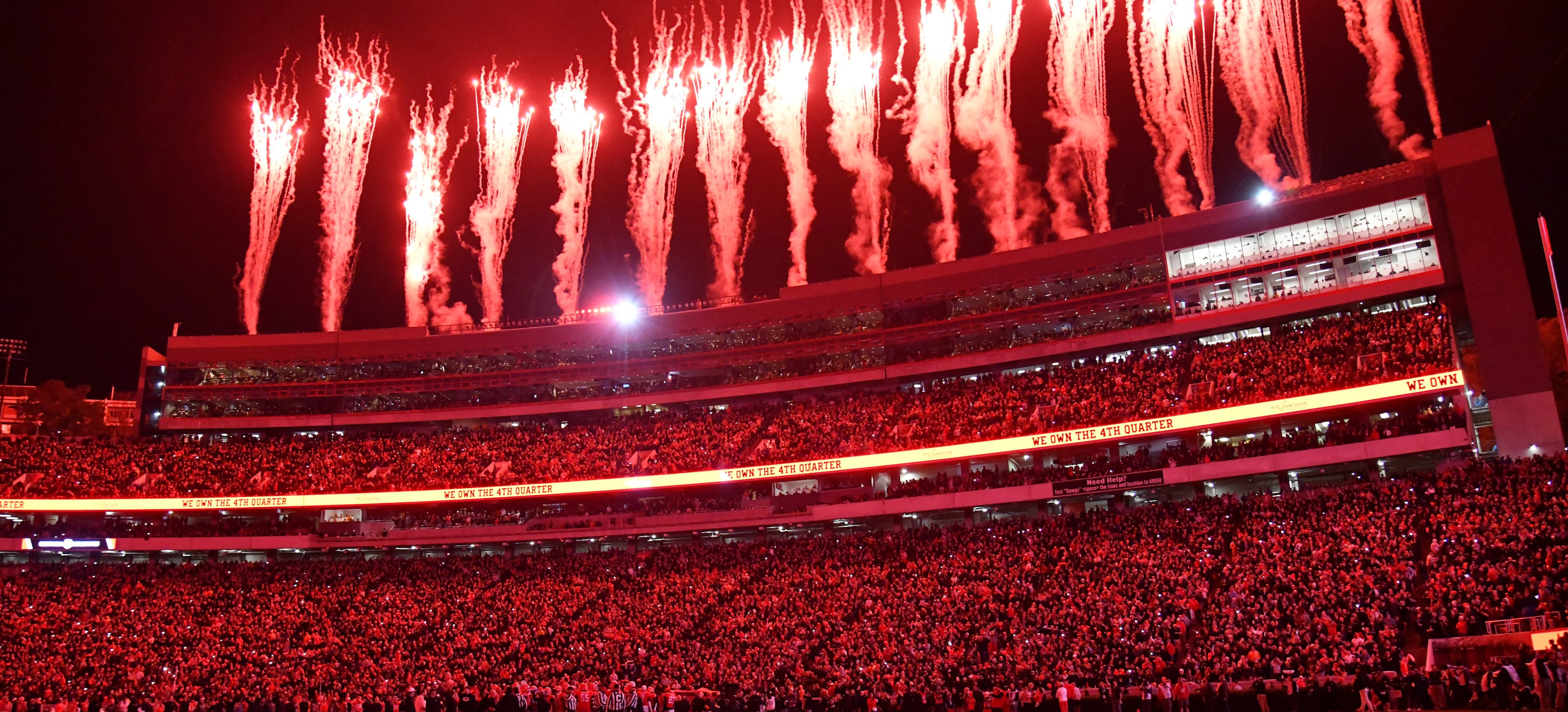Even in Bulldogs’ lowest moments, Georgia-Alabama is a brilliant series

Rennie Curran remembers the 2008 Georgia-Alabama game from the inside. When the two teams met at Sanford Stadium, Curran was an NFL-bound star linebacker for the Bulldogs.
His recollections likely are in line with just about any Bulldogs fan who remembers that epochal matchup, as presumably most past a certain age do.
Among Curran’s memories — the hype before the top-10 matchup at Sanford Stadium (17 years to the day Saturday), the Bulldogs wearing rarely used black jerseys for a blackout game and then the Crimson Tide deflating the Bulldogs, and the crowd, by racing to a 31-0 halftime lead before winning 41-30.
And, of course, how the game has taken on a life of its own, as it helped launch coach Nick Saban’s championship-studded dynasty and was the beginning of Alabama taking firm control of the series.
“I can definitely see how people point back to that ’08 game and just how it was a shift in the tide, literally,” Curran told The Atlanta Journal-Constitution this week, chuckling at his bon mot.
A shift indeed. Georgia faces Alabama on Saturday night at Sanford Stadium, with the Bulldogs having won only one of the past 10 meetings.
It might be asking too much of Georgia fans to embrace that 2008 game. But Curran’s perspective on that historic matchup is worth considering. He was asked, as a member of the losing team, if he would take any extra satisfaction from the Bulldogs toppling Alabama on Saturday — if only because people might stop bringing it up whenever the two teams play.
“It would feel good to be able to remove that, but at the end of the day, that’s all part of what makes this rivalry so special at the same time,” Curran said. “It is moments like that.”
It’s a point to contemplate. Alabama-Georgia has become a series unlike few others, maybe any other. And the fact that a game from 17 years ago can be remembered with little effort speaks to the rivalry’s stature. The 2008 game does occupy a particular place in memory banks because it represented a change in the dynamics of the series. Georgia had won the previous three.
But the fact that four of the past 10 meetings have been for the SEC championship (all won by Alabama) and an additional two were contested for national championships (split an even 1-1) only reinforces what differentiates the series.
The volume of talent stuffing the field in each game is another separator. In that 2008 game, for instance, 12 players in the Tide’s starting 22 went on to be drafted, including five first-rounders, most notably Julio Jones. Georgia actually had 14 future draft picks in its starting 22. That included three first-rounders, notably 2009 first overall pick Matthew Stafford.
Two of Alabama’s backup running backs in that game also became first-round picks — Mark Barron and Mark Ingram — and Ingram won the Heisman Trophy the next year.
“You were going against NFL-caliber talent at every position,” Curran said of Alabama.

It’s a series truly worth our appreciation. And to that end, it’s worth revisiting this pivotal moment in the series. We call upon the memory banks of Curran and another participant in that clash, former Georgia defensive ends coach Jon Fabris, who was on coach Mark Richt’s staff from 2001-09.
Fabris recalled his concerns, even before the season began, that the 2008 team was not as strong as the 2007 team — which had finished No. 2 in the country. Hype surrounded the talented offensive trio of the quarterback Stafford, running back Knowshon Moreno and wide receiver A.J. Green, but Fabris recognized inexperience and lack of depth elsewhere. Still, the Bulldogs were ranked No. 3 while Alabama was No. 8, both 4-0.
“So, going into that game, everybody was like, ‘We’re going to go all the way and win the championship, not lose a game,’” Fabris told the AJC this week. “The hype was over the top.”
And on that night, Alabama was ready to play.
“And I’m not saying we weren’t ready to play,” Fabris said. “But sometimes a game can just from the very get-go just be one-sided, and there it goes. The next thing you know, you’re looking up and it’s like, ‘Man, we’re just fighting just to keep from getting run out of town.’”
Said Curran, “Just the talent (on Alabama’s side) was ridiculous. They definitely caught us off-guard.”
Fabris’ memories centered more on Georgia’s attempted comeback in the second half, catalyzed by special teams. In the third quarter, the Bulldogs blocked a punt that led to their first touchdown, which closed Alabama’s lead to 31-10 and gave UGA a glimmer of hope.
“Zach Renner, who was a walk-on, a kid from Connecticut,” Fabris said. “I could tell you stories about him — a kid who just shows up on our campus. He blocks a punt. In fact, he, to this day, still is tied for the career lead in blocked punts in Georgia history, and he only played two seasons at Georgia.”
If you’re wondering, Fabris’ recollection is completely accurate, up to Renner’s place in the record books. He recalled Prince Miller’s 92-yard punt return for a touchdown (“a cornerback for us from up in the upstate in South Carolina. Good athlete, good player.”), even getting the yardage right. Georgia’s special teams also contributed a successful onside kick. But a spark from the kicking game was not nearly enough.
“Certainly, that was kind of the start of the Saban dynasty at Alabama,” Fabris said.
On Saturday night in Athens, perhaps Georgia turns around the direction of the series in similarly breathtaking fashion.
“I’ve got a good feeling about Saturday,” said Curran, who is a motivational speaker and leadership coach.
Maybe the Bulldogs won’t. Either way, if we’re lucky, we’ll still be talking about it in 2042.



